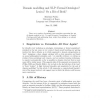988 search results - page 139 / 198 » SenseNet: A Knowledge Representation Model for Computational... |
AO
2005
13 years 8 months ago
2005
There are a number of genuinely open questions concerning the use of domain models in nlp. It would be great if contributors to Applied Ontology could help addressing them rather ...
CVPR
2011
IEEE
13 years 5 months ago
2011
IEEE
This paper addresses the problem of learning object models from egocentric video of household activities, using extremely weak supervision. For each activity sequence, we know onl...
LPAR
1999
Springer
14 years 1 months ago
1999
Springer
Abstract. Description Logics (DLs) are a family of knowledge representation formalisms mainly characterised by constructors to build complex concepts and roles from atomic ones. Ex...
WWW
2007
ACM
14 years 9 months ago
2007
ACM
As the amount of data being generated in biology has increased, a major challenge has been how to store and represent this data in a way that makes it easily accessible to researc...
CVPR
2005
IEEE
14 years 2 months ago
2005
IEEE
Here we explore a discriminative learning method on underlying generative models for the purpose of discriminating between object categories. Visual recognition algorithms learn m...


